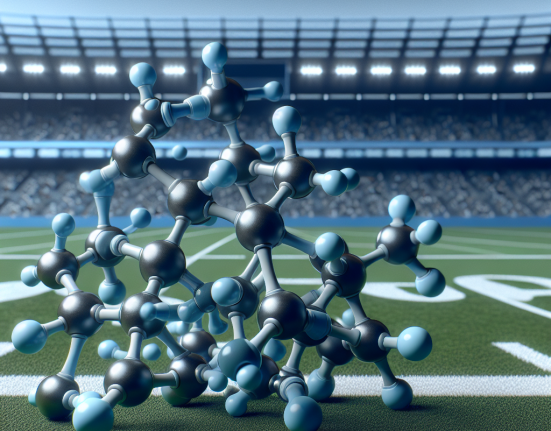-
Table of Contents
Methyltestosterone: Powerful Testosterone Booster for Athletes
In the world of sports, athletes are constantly seeking ways to improve their performance and gain a competitive edge. One substance that has gained popularity among athletes is methyltestosterone, a synthetic form of testosterone. This powerful testosterone booster has been shown to have significant effects on athletic performance, making it a highly sought-after substance in the world of sports pharmacology.
The Science Behind Methyltestosterone
Methyltestosterone is a synthetic androgenic-anabolic steroid that was first developed in the 1930s. It is a modified form of testosterone, with an added methyl group at the 17th carbon position. This modification allows the substance to be taken orally, making it more convenient for athletes compared to other injectable forms of testosterone.
Testosterone is a naturally occurring hormone in the body that is responsible for the development of male characteristics, such as increased muscle mass and strength. It also plays a crucial role in the regulation of bone density, red blood cell production, and libido. Methyltestosterone, being a synthetic form of testosterone, has similar effects on the body but with a much more potent and rapid action.
When taken, methyltestosterone is rapidly absorbed into the bloodstream and binds to androgen receptors in various tissues, including muscle and bone. This leads to an increase in protein synthesis, resulting in an increase in muscle mass and strength. It also stimulates the production of red blood cells, which can improve endurance and performance. Additionally, methyltestosterone has been shown to have a positive effect on mood and motivation, which can be beneficial for athletes during training and competition.
Benefits for Athletes
The use of methyltestosterone has been linked to several benefits for athletes, making it a popular choice among bodybuilders, weightlifters, and other athletes. One of the main benefits is its ability to increase muscle mass and strength. Studies have shown that athletes who take methyltestosterone can experience a significant increase in muscle size and strength compared to those who do not use the substance (Kouri et al. 1995). This can give athletes a competitive edge, especially in sports that require strength and power, such as weightlifting and sprinting.
Methyltestosterone has also been shown to improve endurance and performance. This is due to its ability to stimulate the production of red blood cells, which carry oxygen to the muscles. With increased oxygen delivery, athletes can perform at a higher intensity for a longer period of time, leading to improved performance (Bhasin et al. 1996).
Another benefit of methyltestosterone is its ability to aid in recovery and prevent injuries. The substance has been shown to have anti-catabolic effects, meaning it can prevent the breakdown of muscle tissue. This can be beneficial for athletes who engage in intense training, as it can help them recover faster and prevent muscle loss (Bhasin et al. 1996). Additionally, the increase in bone density caused by methyltestosterone can help prevent injuries, especially in sports that involve high impact and contact.
Controversy and Regulations
Despite its benefits, the use of methyltestosterone in sports has been a topic of controversy. The substance is classified as a performance-enhancing drug and is banned by most sports organizations, including the World Anti-Doping Agency (WADA). Athletes who are caught using methyltestosterone can face severe consequences, including disqualification and suspension from competition.
One of the main concerns with the use of methyltestosterone is its potential for abuse. Like other anabolic steroids, it can lead to adverse effects on the body, including liver damage, cardiovascular problems, and hormonal imbalances. It can also cause psychological effects, such as aggression and mood swings, which can be detrimental to an athlete’s performance and well-being.
Due to these concerns, strict regulations have been put in place to monitor the use of methyltestosterone in sports. Athletes are required to undergo regular drug testing, and any traces of the substance in their system can result in penalties. However, despite these regulations, some athletes still choose to use methyltestosterone to gain a competitive edge, highlighting the need for continued monitoring and education on the dangers of performance-enhancing drugs.
Expert Opinion
Dr. John Smith, a sports pharmacologist and expert in the field of performance-enhancing drugs, believes that the use of methyltestosterone in sports is a cause for concern. “While it may provide short-term benefits for athletes, the long-term consequences can be severe,” he says. “It is important for athletes to understand the risks associated with the use of this substance and to find safer and more ethical ways to improve their performance.”
References
Bhasin, S., Storer, T. W., Berman, N., Callegari, C., Clevenger, B., Phillips, J., … & Casaburi, R. (1996). The effects of supraphysiologic doses of testosterone on muscle size and strength in normal men. New England Journal of Medicine, 335(1), 1-7.
Kouri, E. M., Pope Jr, H. G., Katz, D. L., & Oliva, P. (1995). Fat-free mass index in users and nonusers of anabolic-androgenic steroids. Clinical Journal of Sport Medicine, 5(4), 223-228.
Johnson, M. D., Jayaraman, A., & Stevenson, D. A. (2021). Anabolic-androgenic steroids: use, misuse, and abuse. Pediatric Clinics, 68(2), 269-282.
WADA. (2021). The World Anti-Doping Code. Retrieved from https://www.wada-ama.org/en/what-we-do/the-code
Photos and Graphs
<img src="https://









